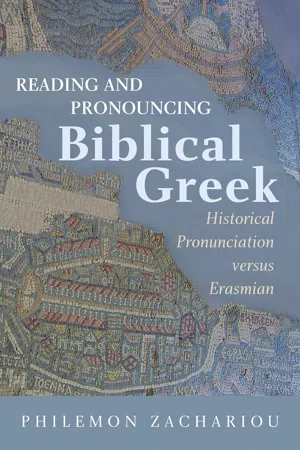
Reading and Pronouncing Biblical Greek
Historical Pronunciation versus Erasmian
Philemon Zachariou
- 192 pages
- English
- ePUB (mobile friendly)
- Available on iOS & Android
Reading and Pronouncing Biblical Greek
Historical Pronunciation versus Erasmian
Philemon Zachariou
About This Book
This book invites you to see not only how Hellenistic Koine ought to be pronounced but also why. Rigorously investigating the history of Greek orthography and sounds from classical times to the present, the author places linguistic findings on one side of the scale and related events on the other. The result is a balance between the evidence of the historical Greek sounds in Koine and pre-Koine times, and the political events that derailed those sounds as they were being transported through Europe's Renaissance academia and replaced them with Erasmian.This book argues for a return to the historical Greek sounds now preserved in Neohellenic (Modern Greek) as a step toward mending the Erasmian dichotomy that rendered post-Koine Greek irrelevant to New Testament Greek studies. The goal is a holistic and diachronic application of the Hellenic language and literature to illume exegetically the Greek text, as the New Testament contains numerous features that have close affinity with Neohellenic and should not be left unexplored.
Frequently asked questions
Information

Authentic Greek Sounds

The Development of Κοινή
1.1 The First Hellenes (Greeks)
1.2 Periods of the Hellenic Language
Table of contents
- Title Page
- Acknowledgments
- Abbreviations
- Why This Book
- Pronunciation Matters
- Questions
- Part One: Authentic Greek Sounds
- Part Two: The Erasmian Influence
- Appendix 1: Decrees of Classical Athens and Their Historical Sounds
- Appendix 2: Changes in the Attic Alphabet and Their Significance
- Appendix 3: Greek Dimorphia
- Appendix 4: Formal/Informal Pronunciation
- Appendix 5: Chronological Table of the Changes in the Attic Alphabet11
- Bibliography